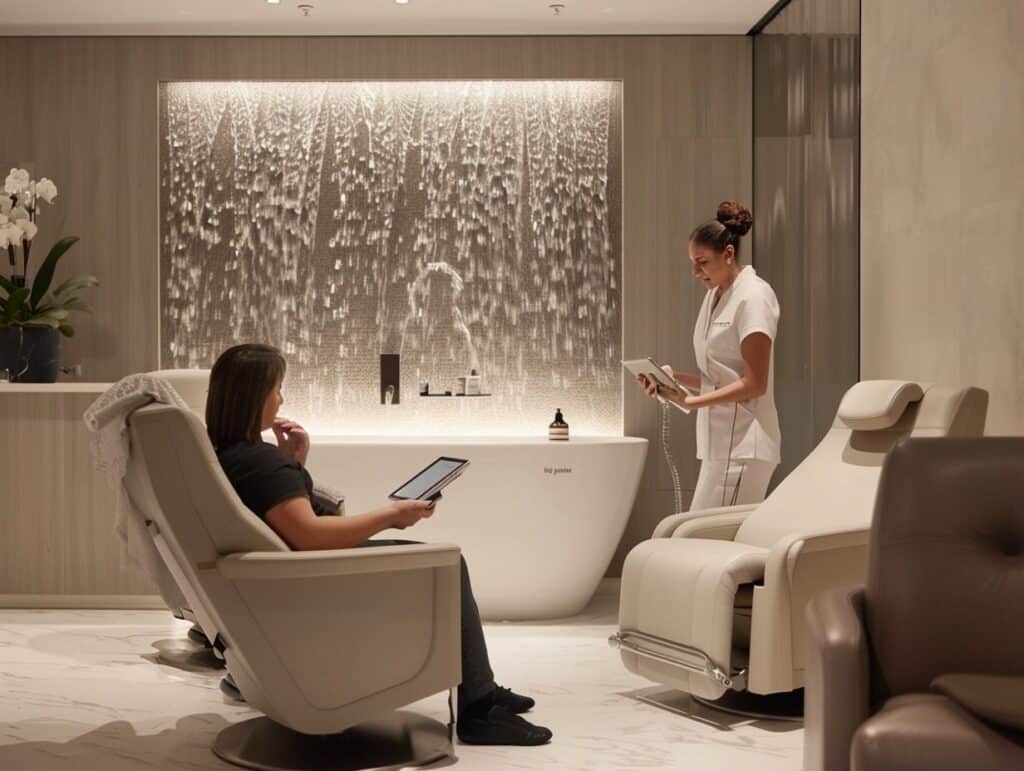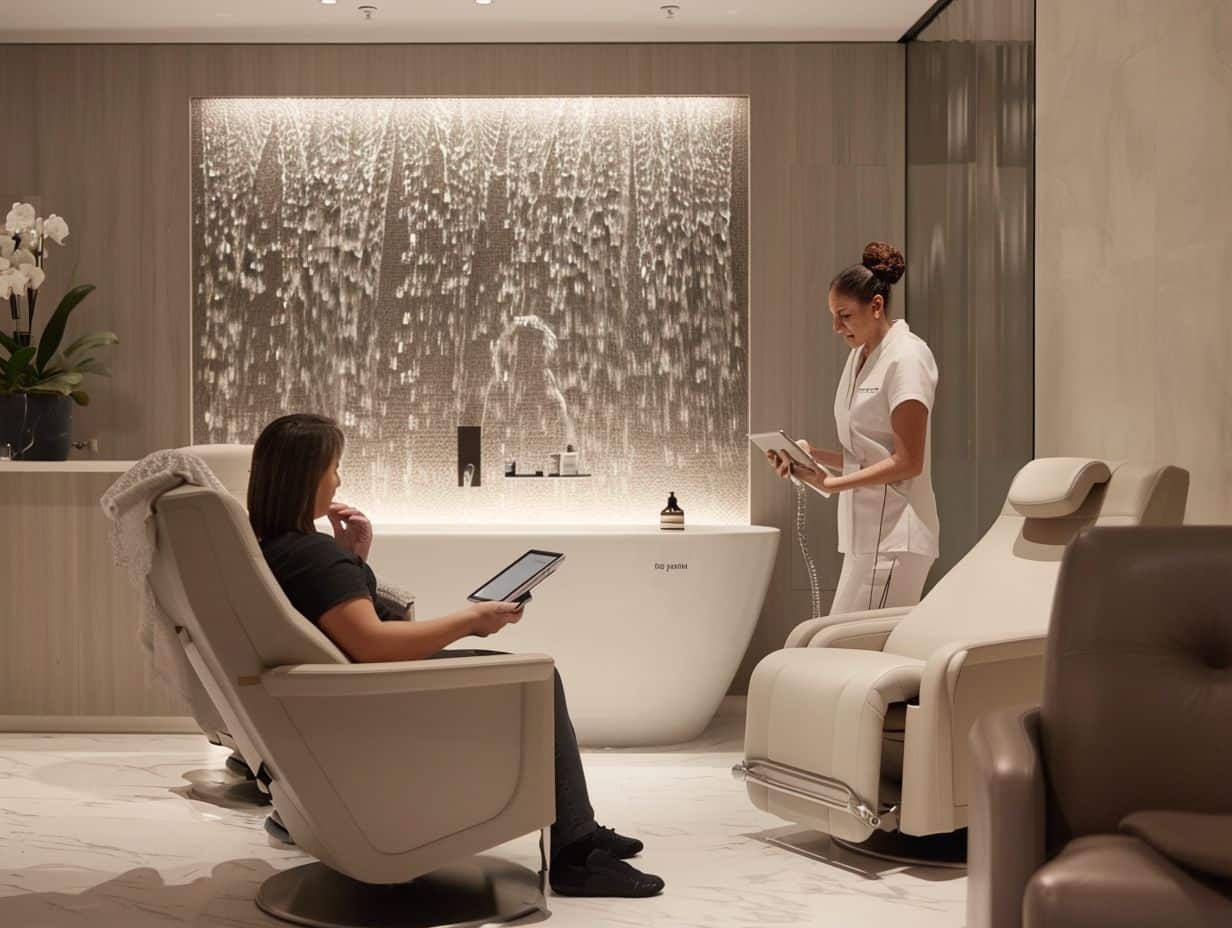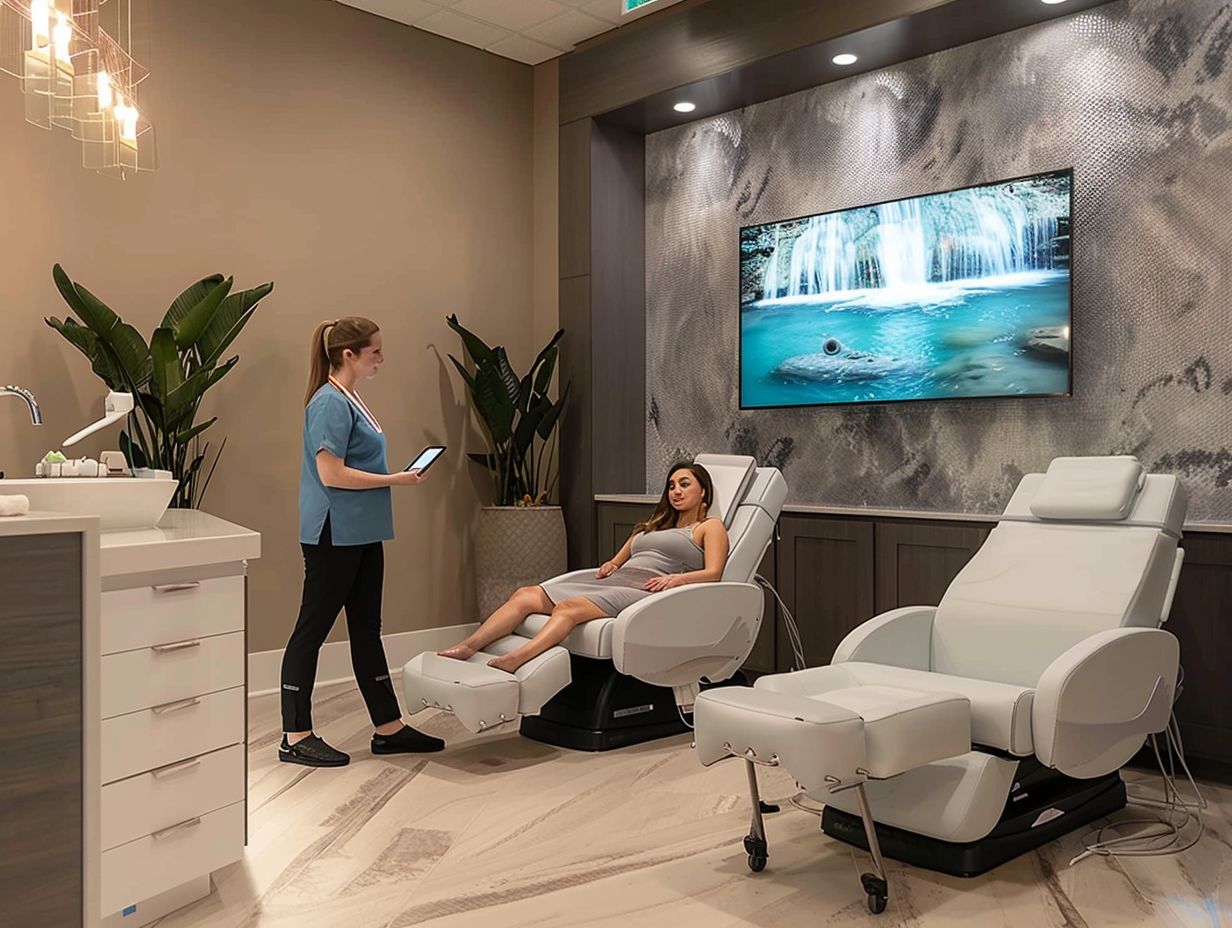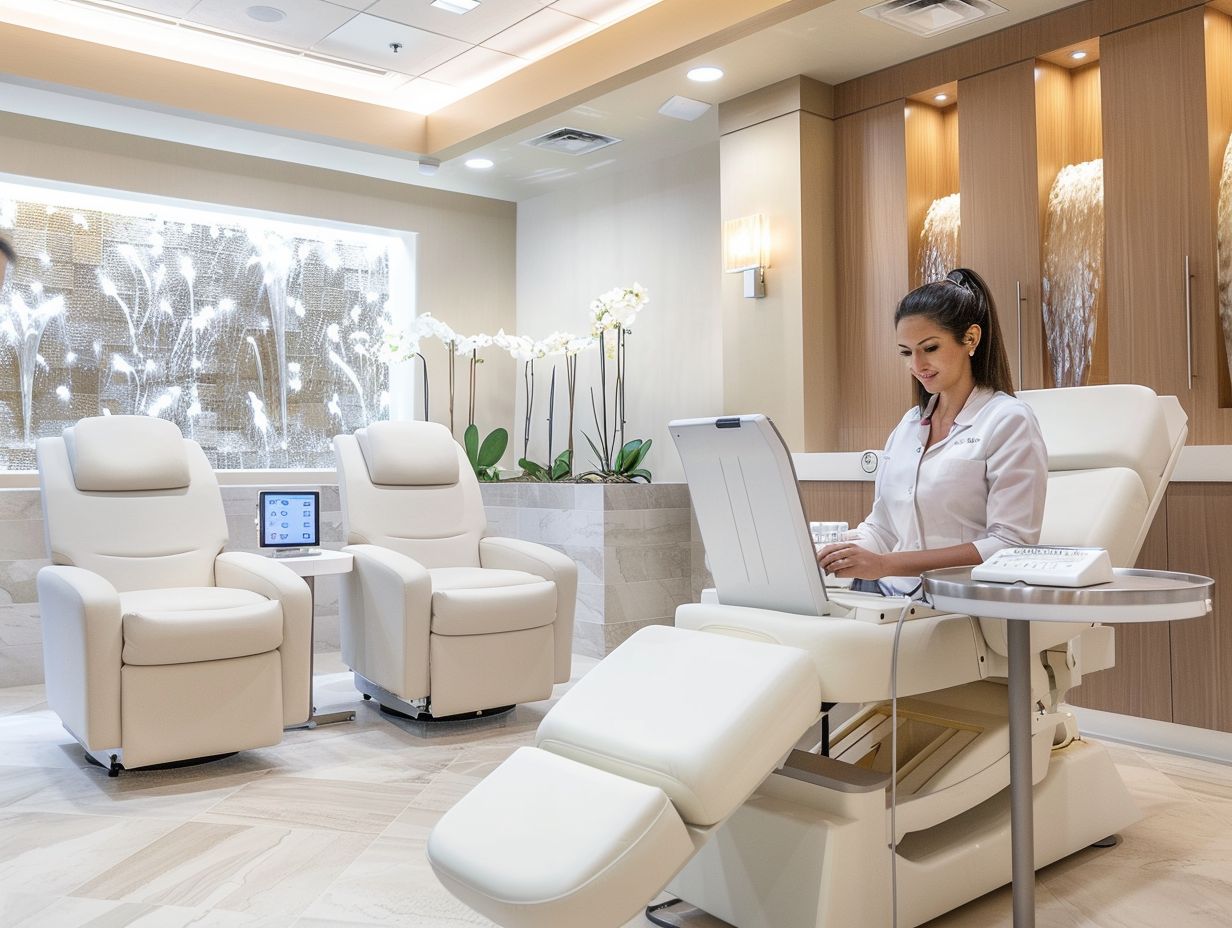How AI Will Grow Your Medical Spa

Artificial intelligence (AI) is revolutionizing many industries, and digital marketing for medical spa practices is no exception.
From personalized targeting to predictive analytics, AI offers powerful tools that can enhance customer engagement and streamline marketing efforts. MediSpa.ai is the leader in AI Treatment Recommendations
This explores how AI can transform your med spa, including its benefits and potential challenges.
Whether you’re looking to attract new clients or improve your existing services, understanding AI’s role in digital marketing could be the key to your practice’s growth.
What is AI?

Artificial Intelligence (AI) is a transformative technology defined by its ability to simulate human intelligence processes through the use of algorithms and data. In the healthcare industry, AI is revolutionizing the way organizations analyze patient data, automate administrative tasks, and enhance patient engagement, leading to improved outcomes and efficiency across various services. This innovative technology is paving the way for personalized care and unique treatment recommendations, ultimately reshaping how patients interact with healthcare providers.
How is AI Used in Digital Marketing for Med Spa Practices?
In the realm of digital marketing, AI is increasingly becoming a pivotal tool for medspa practices, facilitating enhanced customer engagement and driving targeted campaigns that resonate with patients. By leveraging AI technologies such as predictive analytics, automated scheduling, and social media integration, medispas can create personalized marketing strategies that improve conversion rates and client retention. This integration not only streamlines workflows but also provides actionable insights to optimize marketing efforts and patient interactions.
Personalized Targeting
Personalized targeting is a marketing strategy that uses AI to analyze patient data and tailor marketing efforts to individual needs, ultimately enhancing the customer experience. This approach allows medspas to deliver targeted promotions and communications that resonate with specific segments of their clientele, significantly improving engagement rates and conversion rates.
By implementing personalized targeting, medspas can reach consumers more effectively through a well-defined process of segmentation. This involves dividing clients into distinct groups based on various criteria such as demographics, preferences, and behaviors. Once these segments are identified, data analysis plays a crucial role in understanding the motivations and needs of each group.
- For instance, younger clients may respond better to social media campaigns, while older clients might prefer email newsletters with exclusive offers.
- Utilizing customer feedback allows for more refined targeting, ensuring that marketing messages resonate with their audience.
Ultimately, this tailored approach not only helps medspas achieve higher conversion rates but also fosters stronger relationships with clients, positioning them for long-term success in a competitive landscape.
Predictive Analytics
Predictive analytics leverages historical data and AI algorithms to forecast future patient behavior, enabling medspas to enhance patient engagement through proactive marketing strategies. By analyzing trends and patterns in patient data, businesses can anticipate customer needs and preferences, helping to design targeted promotions and improve overall customer satisfaction.
The significance of this data-driven approach cannot be overstated; it transforms the way medical spas interact with their clientele. With predictive analytics, organizations can identify key insights into patient demographics, enabling a more personalized experience that resonates at a deeper level.
- For instance, understanding peak appointment times allows for optimized staffing, leading to reduced wait times.
- The ability to predict which treatments may interest specific segments ensures that marketing messages hit the mark.
- Engaging with patients based on their prior interactions increases the likelihood of return visits and fosters loyalty.
Ultimately, for medspa practices aiming to stay competitive, integrating predictive analytics into their marketing strategies is not just beneficial; it is essential for cultivating lasting relationships with patients and maximizing operational efficiency.
Automated Email Marketing
Automated email marketing is a powerful tool that utilizes AI to send personalized communications to patients, enhancing engagement and improving the effectiveness of marketing campaigns.
By automating workflows, medspas can efficiently manage client communications, ensuring that patients receive timely information regarding promotions, services, and reminders.
This innovative approach not only saves time but also allows for targeted messaging tailored to specific client needs and preferences. For instance, automated email marketing systems can segment audiences based on their previous interactions, enabling the delivery of customized content that resonates with them.
These automated messages can be scheduled to arrive at optimal times, maximizing open rates and engagement. Think about it: when clients receive timely reminders or exclusive offers, their likelihood of booking an appointment often increases significantly.
- Personalized content helps build stronger relationships with clients.
- Enhances operational efficiency by reducing manual effort.
- Improves overall marketing ROI through targeted campaigns.
Implementing automation not only streamlines communication but also fosters loyalty and satisfaction among patients.
Chatbots for Customer Service

Chatbots are AI-driven tools that provide instantaneous customer service, improving the patient experience by offering support and information around the clock. They can handle inquiries, assist with scheduling appointments, and guide users through virtual consultations, thereby reducing administrative tasks and enhancing patient engagement.
By leveraging these advanced systems, medspa practices can significantly streamline operations. With functionalities that include 24/7 availability, chatbots can effectively manage high volumes of inquiries without the need for constant human oversight. This not only speeds up response times but also allows staff to focus on more complex patient needs. By delivering personalized interactions based on previous visits or preferences, chatbots enhance patient satisfaction.
- Quick Response: Reduced wait times for patients seeking information.
- Appointment Management: Simplified scheduling processes.
- Data Collection: Efficiently gather patient feedback for continuous improvement.
Such capabilities demonstrate that chatbots are not merely tools, but pivotal components in modern healthcare delivery, ensuring an engaging experience for users while also optimizing clinic operations.
What are the Benefits of AI in Digital Marketing for Med Spa Practices?
The integration of AI in digital marketing for medspa practices offers numerous benefits, driving greater efficiency, enhanced customer engagement, and ultimately, business growth. By automating marketing processes, utilizing data-driven insights, and personalizing client communications, medspas can effectively connect with patients, improve conversion rates, and optimize their marketing strategies for success.
Increased Efficiency and Productivity
AI-driven automation significantly increases efficiency and productivity in medspa practices, allowing staff to focus on patient care rather than administrative tasks. By streamlining workflows and automating repetitive processes, AI enables practices to operate more effectively and efficiently.
For instance, in a typical medspa setting, AI-powered scheduling software can swiftly manage patient appointments, reducing the likelihood of double bookings and minimizing wait times. This not only enhances the patient experience but also allows the staff to dedicate more time to individual care.
Utilizing AI-based customer relationship management systems helps practices track patient histories and preferences, paving the way for personalized treatment plans without requiring extensive manual data entry.
- Automated reminders for appointments improve attendance rates.
- AI analytics can forecast patient flow, aiding in resource allocation.
- Chatbots can address common patient inquiries around the clock, freeing staff for more complex questions.
These applications of AI not only bolster overall operational efficiency but also lead to improved patient outcomes and satisfaction, reflecting a notable shift in how medspas can leverage technology for better care delivery.
Improved Customer Engagement
With the implementation of AI, medispa practices can significantly improve customer engagement through personalized services that cater to individual patient needs and preferences. By utilizing data analysis and feedback mechanisms, practices can enhance the overall customer experience, leading to higher patient satisfaction and retention rates.
These innovative approaches serve as a foundation for developing deeper connections with clients, ultimately translating to better patient relationships. Specifically, targeted marketing strategies can be used to reach out to potential clients based on demographic information and previous interactions, thus ensuring that every engagement is relevant and timely.
- By analyzing patient history, practices can tailor offers that resonate with individual preferences, ensuring a more personal interaction.
- Feedback loops allow practices to adapt services based on real-time insights, further enhancing the patient experience.
- This continuous improvement fosters trust and encourages existing clients to remain loyal while also attracting new clientele.
In this way, medspa services are not just treatments, but enriching experiences that leave a lasting impact on clients.
Cost Savings
AI contributes to cost savings in medspa practices by optimizing operational efficiency and reducing the need for extensive administrative tasks. By automating routine processes, medspas can allocate resources more effectively and lower healthcare costs while maintaining high levels of patient service.
The implementation of AI in medspa operations extends beyond mere automation.
Specifically, automated scheduling systems can enhance appointment management, minimizing cancellations and no-shows. AI-driven chatbots can handle patient inquiries 24/7, significantly reducing the administrative workload.
- AI tools can analyze patient data, allowing for personalized treatment recommendations, improving patient satisfaction, and ultimately leading to higher retention rates.
- Utilizing AI for inventory management can pinpoint trends, ensuring essential supplies are maintained efficiently and costs are minimized.
By integrating these technologies, medspas not only streamline their operations but also create a more responsive and cost-effective service model, paving the way for improved profitability.
How Can AI Help Grow Your Medical Spa?

AI has the potential to significantly grow medical spa practices by attracting new customers, retaining existing ones, and enhancing overall marketing strategies. Through data-driven insights, targeted campaigns, and personalized client communications, medspas can effectively reach their target audience, foster loyalty, and drive business growth.
Attracting New Customers
Attracting new customers is essential for the growth of any medical spa, and AI-powered digital marketing strategies can play a pivotal role in achieving this goal. By utilizing targeted campaigns and analyzing patient behavior, medspas can effectively reach potential clients and convert them into loyal customers.
To begin with, implementing:
- targeted advertising: By leveraging AI algorithms to analyze demographic data, medical spas can create ads that speak directly to the interests and preferences of their ideal clientele.
- data analysis: Regular tracking of customer interactions and feedback allows for ongoing adjustments to marketing efforts, making them more efficient over time.
- personalization: Crafting personalized emails or messages based on previous services can enhance client engagement and drive repeat business.
Utilizing chatbots for immediate customer inquiries can significantly improve response times, making potential clients feel valued and appreciated. Adopting these AI-driven strategies not only enhances customer connections but also reduces marketing expenditures while maximizing outreach.
Retaining Existing Customers
Retaining existing customers is crucial for long-term success in the medspa industry, and AI can significantly enhance customer satisfaction and engagement. By providing personalized services and efficient communication, practices can foster loyalty and encourage repeat visits.
AI tools allow medspa businesses to analyze client preferences and behaviors, enabling the creation of tailored experiences that resonate with individual customers. For instance, advanced data analytics can yield insights into treatment history, skin types, and specific concerns, allowing for customized recommendations that make customers feel valued.
- Effective communication: Automated reminders and follow-up messages ensure clients never miss an appointment or treatment suggestion.
- Feedback integration: Regularly gathering feedback through AI-driven surveys helps medspas adapt and evolve their services.
Consequently, harnessing AI for personalized care and strategic engagement fosters deeper connections, thus leading to higher retention rates and more flourishing client relationships.
Improving Customer Experience
AI plays a crucial role in improving customer experience within medical spas by offering personalized care tailored to individual patient needs. By utilizing feedback mechanisms and data analysis, medspas can continuously refine their services to enhance customer satisfaction and loyalty.
This advancement is not merely about implementing technology; it represents a fundamental shift in how patients interact with health and wellness services. With AI-driven insights, medical spas can curate unique experiences based on individual preferences and past visits, ensuring that each client feels valued and understood.
Through detailed analytics, staff can better anticipate patient needs, offering customized treatment plans and services that resonate with their expectations. Leveraging customer feedback helps identify areas for improvement, leading to more effective operational strategies over time.
Such a responsive approach not only fosters
- greater patient engagement
- enhanced trust
- improved overall satisfaction
but also strengthens the spa’s reputation in an increasingly competitive market.
Enhancing Marketing Strategies
AI enhances marketing strategies for medical spas by providing data-driven insights that inform decision-making and campaign effectiveness. This ability to analyze customer data allows practices to fine-tune their marketing approaches and ensure they resonate with targeted audiences.
By leveraging comprehensive analytics, practices can uncover patterns in customer behavior and preferences, enabling tailored messaging that captures attention and drives engagement. The technology not only automates routine tasks but also plays a critical role in segmenting audiences based on specific demographics and interests.
This targeted approach enhances the overall effectiveness of advertising efforts, ensuring the right clients receive the appropriate marketing messages at the best timing.
- Understanding customer journeys enables personalized experiences.
- Data-driven strategies improve ROI by focusing on high-performing channels.
- Continuous monitoring adapts campaigns in real-time based on feedback.
Ultimately, the integration of AI in marketing elevates performance, allowing medical spas to operate with precision and agility in their outreach efforts.
What are the Potential Challenges of Implementing AI in Med Spa Practices?

While AI offers numerous benefits for medspa practices, its implementation also presents potential challenges that need to be addressed. Resistance to change, integration difficulties, and the need for training in AI technology can hinder the adoption process, making it essential for practices to understand and plan for these obstacles.
Cost of Implementation
The cost of implementing AI technologies can be a significant barrier for medspa practices, requiring a thoughtful financial investment and budget considerations. Practices must evaluate the potential return on investment and carefully plan their resources to effectively integrate AI solutions.
As practices embark on this journey, they are often faced with a variety of expenses, including software licensing fees, hardware enhancements, training for staff, and ongoing maintenance costs. These elements can accumulate quickly, making it essential for medspa owners to develop a comprehensive budget that accurately reflects these financial demands.
- Understanding the initial investment needed can prepare practices for the transition.
- Setting aside funds for unforeseen expenses during the AI integration process can safeguard operations.
- Projecting long-term savings and increased efficiency through AI can help justify these costs.
In assessing the viability of AI adoption, it is crucial for medspas to conduct detailed market research and perhaps consult with financial advisors who specialize in technology investments. With careful financial planning, medspas can strategically navigate the complex landscape of AI integration, ensuring a balanced approach to harnessing its full potential.
Need for Skilled Professionals
The successful integration of AI in medspa practices necessitates the hiring of skilled professionals with expertise in AI technologies and data management. This need for specialized training can pose challenges for practices looking to implement AI effectively.
When considering the adoption of AI, practices must recognize that having knowledgeable experts is crucial for harnessing its full potential. Skilled professionals not only understand the technology but also the specific needs of the medspa sector. They are equipped to identify suitable AI solutions and implement them strategically.
Alongside technical skills, team members require training on:
- ethical considerations,
- data privacy regulations,
- and ongoing system maintenance.
The investment in comprehensive training develops a workforce that not only operates AI systems but enhances patient experiences and outcomes. Therefore, prioritizing expertise leads to more effective AI integration and ensures that the benefits are maximized for both practitioners and clients.
Privacy and Security Concerns
Privacy and security concerns related to patient data are paramount when implementing AI in medspa practices. Ensuring compliance with healthcare regulations and protecting sensitive patient information is critical to maintaining trust and integrity in client relationships.
In this digital age, the integration of AI technologies poses significant challenges for safeguarding patient data, making it essential for practitioners to adopt robust security measures. Failing to ensure the confidentiality and integrity of such information can lead to devastating repercussions, including breaches of trust and legal liabilities.
- Medspa practitioners must proactively identify potential vulnerabilities in their AI systems.
- Regular audits and assessments should be conducted to reinforce security protocols.
- Education and training for staff on data protection are crucial in minimizing risks.
By prioritizing these practices, practitioners not only comply with regulations but also foster a culture of safety that resonates with patients, ultimately upholding the standard of excellence expected in healthcare.
How Can Med Spa Practices Overcome These Challenges?
Medspa practices can effectively overcome the challenges of AI implementation by investing in training for staff and partnering with AI experts. By fostering an environment of continuous learning and collaboration, practices can navigate the complexities of integrating AI technologies and harness their full potential.
Investing in AI Training and Education
Investing in AI training and education for staff is essential for successful integration and utilization of AI technologies in medspa practices. By enhancing skills and knowledge, practices can enable their teams to leverage AI effectively and improve patient care.
To ensure that all team members are equipped with the latest insights and skills, a variety of specific training programs and educational resources have emerged. These include:
- Online Courses: Many organizations offer dedicated online curriculums focused on AI applications in healthcare and medspas, designed to accommodate flexible learning.
- Workshops and Seminars: Attending hands-on workshops provides a practical understanding of how to implement AI tools in everyday operations.
- Certification Programs: Obtaining certifications in AI-related fields helps validate staff expertise, making them confident in utilizing advanced technologies.
- Peer Learning Groups: Establishing forums for discussion among staff can aid in sharing best practices and innovative ways to utilize AI.
By investing in these resources, practices can foster a culture of continuous development, ultimately leading to enhanced service quality and better patient outcomes.
Partnering with AI Experts
Partnering with AI experts can provide invaluable support and insights for medspa practices looking to implement AI technologies effectively.
These collaborations can guide practices through the integration process, ensuring that they make informed decisions and maximize the benefits of AI. By collaborating with specialists, practices gain access to a wealth of resources that can streamline their operations and reduce the learning curve associated with new technologies. This strategic partnership not only enhances the efficiency of service delivery but also enables medspas to harness the full potential of AI tools.
- Experts bring cutting-edge knowledge, allowing practices to stay ahead of trends.
- They offer tailored solutions, addressing specific operational challenges faced by medspas.
- Access to proprietary tools can lead to innovative treatment offerings and improved client satisfaction.
Ultimately, partnering with AI professionals fosters a more cohesive transition to technology-driven practices, paving the way for growth and increased competitiveness in the evolving market.
Frequently Asked Questions
What is AI and how does it apply to medical spas?
AI, or artificial intelligence, refers to the ability of computer systems to perform tasks that typically require human intelligence, such as decision-making, problem-solving and learning. In the context of medical spas, AI can be used to analyze data and make predictions, ultimately helping to improve marketing strategies and grow the business.
How can AI help improve customer experience at a medical spa?
AI can assist in personalizing the customer experience at a medical spa by analyzing data on previous treatments and purchases, as well as demographic information. This can help tailor marketing efforts and promotions to specific target audiences, leading to a more positive and personalized experience for customers.
Will AI replace human employees at a medical spa?
No, AI is not meant to replace human employees at a medical spa. Rather, it can assist in automating certain tasks and processes, freeing up employees to focus on more important tasks such as customer service and treatment procedures.
How does AI help with marketing strategies for a medical spa?
AI can analyze data from various sources, such as social media and website analytics, to identify trends and patterns. This information can then be used to create targeted and effective marketing campaigns, resulting in increased brand awareness and customer retention for the medical spa.
Are there any risks associated with using AI in a medical spa?
As with any new technology, there may be some risks associated with using AI in a medical spa. These may include data privacy concerns and potential biases in the data used. However, with proper safeguards and regulations in place, these risks can be minimized.
How can a medical spa implement AI into its operations?
There are various ways that a medical spa can implement AI into its operations, such as using chatbots for customer service, using AI-powered software for scheduling appointments and managing inventory, and using AI for targeted marketing efforts. It is important to carefully assess the needs and capabilities of the business before implementing AI technology.
